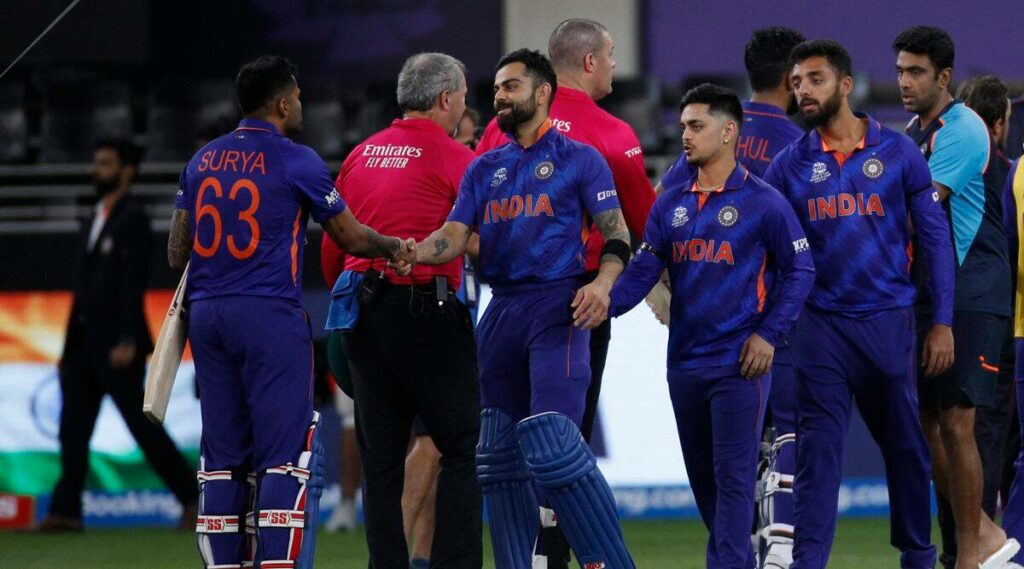Table of Contents
Expectations were riding high before the start of the World Cup as Virat Kohli led the Indian team for the first time in the tournament. But, an abysmal start against Pakistan and another defeat against New Zealand spelled the end of a disappointing campaign as India’s three victories against Afghanistan, Scotland, and Namibia counted for nothing at the end of the day.
The tournament served as the last gasp in Ravi Shastri’s 5-year tenure as the head coach of the Indian team in which the Kohli-led squad achieved numerous feats. From being the No.1 test team for 42 months to defeating Australia twice in their home conditions, Shastri and co. set new benchmarks for the incoming Rahul Dravid.
But, the end was on a sour note as Shastri failed to lift an ICC trophy in the last five years, and here, we look at three major reasons why India got knocked out of the T20 World Cup.
Poor form of top-order batsmen
Indian skipper Kohli, top-order everpresent Rohit Sharma, the exuberant KL Rahul, and the promising Suryakumar Yadav were in patchy form during the second leg of IPL 2021 held in UAE as well.
The quartet failed to score big runs with Rahul a head above the rest, but the Punjab Kings skipper played as the anchor for his IPL franchise but was given the role of the quick-starter in the Indian team with Sharma or Kohli aggregating runs from one end.
India’s campaign got off to a sluggish start as they lost Rahul, Rohit, and Yadav to the in-form Pakistan bowling attack in their tournament opener, whilst New Zealand used similar tactics to tighten the noose around the Indian batting line-up.
Rahul is the only batsman in the Top 10 run-getters of the ongoing tournament after the conclusion of the Super 12s stage with most of his runs coming against Afghanistan, Scotland, and Namibia.
Unsettled bowling combination
Yuzvendra Chahal’s exclusion from the 15-member squad for the tournament was a big surprise for everyone as the wrist-spinner has been a regular feature of the limited-overs team under Shastri’s tenure.
With Jasprit Bumrah, Mohammed Shami, and Ravindra Jadeja the only three nailed on starters in the bowling set-up, Kohli had to experiment with playing Bhuvneshwar Kumar, Shardul Thakur, Varun Chakravarthy, Rahul Chahar, and Ravichandran Ashwin.

The latter proved to be effective on the slow Dubai tracks, but the veteran spinner wasn’t included in crucial matches against Pakistan and New Zealand, which led to the ultimate failure to qualify for the semi-finals.
In the Indian Premier League, Avesh Khan, Harshal Patel, Deepak Chahar, and Arshdeep Singh were in scintillating form. However, the youngsters were ignored in favor of the experienced names and the strategy came back to bite the Indian think tank.
Also read 👉 Rahul Dravid set to take over the reins as head coach after the conclusion of the ICC 2021 T20 World Cup
Bio-bubble fatigue
Bio bubbles are a new thing in international cricket, and not many cricketers or sportspersons have adjusted perfectly to living in a bio-secure bubble with no outside contact for long durations. India’s summer began with the IPL that had to be cut short due to increasing Covid-19 cases.

In June, the Indian team traveled to Southampton for the inaugural ICC WTC Final and stayed there for 100 days in total, which also included four test matches against England and a warm-up match against a select County XI.
A bubble-to-bubble transfer from England to the UAE saw India’s multi-format players like Kohli, Sharma, Rahul, Yadav, Rishabh Pant, Jadeja, Ashwin, Thakur, Shami, Bumrah, and Axar Patel drafted straight into their IPL franchises followed by a gruelling T20 World Cup campaign.
The outgoing head coach claimed that he is drained and the team’s performances were heavily influenced due to the bio-bubble fatigue.
“I am mentally drained but I expect that at my age. These guys are physically and mentally drained, six months in a bubble and we would have ideally liked a bigger gap between the IPL and the World Cup.
It’s when the big games come and when the pressure hits you – you are not that switched on as you should be. And it’s not an excuse. We take defeat because we are not scared of losing. Because in trying to win, you will lose a game.”
It has been suggested by many former players and pundits to separate the teams based on formats to avoid the fixture congestion and bio-bubble fatigue, but the Indian team continues to overwork their best talents all around the year.


